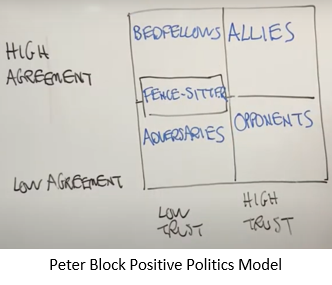Work Models You Need To Know: Ep.3 – POSITIVE POLITICS
If you’d like to watch this as a video instead of reading, just click here.
Politics in the workplace. Not generally considered a good thing. But it’s as real as the wind is reality if you’re in a sailing boat. We need an angle if we’re going to get things done so we can earn our keep.
We can get that angle from the work of Peter Block and his model which I call his ‘Positive Politics’ model. Not only will it help you make sense of the political relationships going on in your workplace, it gives us some strategies to make things better.
You can find this model in his brilliant book The Empowered Manager. It’s one of the classics, now in a second edition.
Politics
First, some origins. The word ‘politics’ comes from the Greek word ‘politikos’ which includes the words for ‘citizen’ and ‘city’. Change ‘city’ to ‘organisation’ and you can see that any time you try to start, stop or keep something going in an organisation…it’s a political act.
This lets us move politics from automatically thinking about characters like this…

…and instead see it as simply working with people to get things done…which means relationships. Peter Block’s Positive Politics gives us a simple yet powerful way to understand these.
Agreement and Trust
Peter Block gives us two angles to look at work relationships from – Agreement and Trust. When we talk Agreement, it’s about your intentions, your plans, what you want to happen next… the classic ‘are you for me or against me’. As for Trust, I like to throw in my own personal definition:
You are trustworthy if someone knows that nothing adverse will happen to them because of you…without you telling them about it first and giving them a fair chance.
My definition is quite practical and note that it doesn’t confuse trust with agreement. It just means that if I’m going to try to make my thing get priority over yours…you’ll know about it and have the chance to put your case forward. You can trust me. You don’t have to watch your back.
Put these axes together and we get:

…and you’ll notice the bonus fifth section over on the Low Trust side.
Quick definitions
Allies are people who agree with you who you can trust. They’re ‘on board’, and are part of your inner circle. You know them, you get coffee with them all the time and share your disappointments.
Opponents are people who don’t agree with you…and you know where they stand. You respect them, and you would be genuinely surprised if they went around you or made moves that caused you damage. The key is that they are not…
Adversaries are those with whom you not only disagree with what they want to do, you also can’t trust them. You believe they’ll go around you, things you wish they’d told you about, you find out later, and the most obvious sign…you talk about them to others (including people outside of work) way too much.
Bedfellows are those that agree with you or support your plans…but you always feel cautious. It seems they have an agenda, and you end up wondering why they are supporting you. This comes from a lack of trust under the surface, which is why they are not Allies.
Fence-Sitters are our bonus area on the Low Trust side. These are people that you can’t tell whether they are for or against your plans. Often classic bureaucrats, they are masters at telling which way the wind is going and will opt for the path of maximum safety for themselves. The Kenneth Galbraith quote “in any great organisation, it is far, far safer to be wrong with the majority than to be right alone” is made for them…they just need to know what the majority is doing first! (And if you’re trying to change things…this isn’t you!)
What Do We Do With This?
You can immediately use this model to start considering all the key relationships you have or need at work. Where would people currently sit? The Agreement side is usually quite straightforward, it’s the Trust one where the nuance lies. The classic mistake is putting people in the bottom-left – no one is an Adversary until you’ve spoken to them and tried to build a relationship of trust. More on this below.
The reason it’s caused Positive Politics is to both a) acknowledge that all actions in organisations are political, and b) to allow or encourage these actions to serve the greater good. It’s an underlying assumption that what you’re trying to get done is going to serve the organisation. “Because my boss told me to” isn’t good enough, although understandable. And yes, this stuff applies to the relationship you have with your manager and your own team too.
The Strategies
Different approaches apply to different relationships. Here’s how I describe to my clients how Peter Block lays them out:
Allies – deepen
Allies are your inner circle as you have full trust and agreement. The work here is to deepen the relationship. Let them know your worries, your concerns (if you have doubts about doing this, you may have a Bedfellow, not an Ally), and make sure you find out what makes them tick too. It doesn’t matter where they are in the organisation, this is the primary network that lets you get things done.
Opponents – value them
Your Opponents bring out the best in you. Peter Block uses the analogy of tennis – I like to point out how legends Roger Federer and Rafael Nadal push each other to greater and greater heights. They have complete trust – neither of them thinks the other would ever try something underhanded, yet they completely disagree on who should win the tournament.

The approach with Opponents is to let them know how much you value the relationship. That, while you might frustrate each other, you know that you wouldn’t be as good on your own in the long run. You appreciate how they always play fair, and wouldn’t have any other way (except it would be great if they agreed….but only if they believed it!)
Bedfellows – follow the golden rule
For Bedfellows, follow the golden rule – treat others as you want to be treated yourself. You don’t need to talk content here – these people agree with you. What you do need to talk about is the relationship, so you can see if there’s any chance of laying the foundations for trust. Ask them how they like work relationships to happen, what matters to them, what sort of behaviours they find reliable. And put your needs on the table too, how you like to work.
Put a bit of energy in here…not too much, but enough to see if a potential move across to Ally is possible. Don’t get too caught up, but give it a shot. At least you’ll have some groundwork to see you through the project you’re Bedfellows for…and perhaps more in the future.
The key here is to maintain your standards, which doesn’t mean “they treated me like that, so I’m going to do the same”. Rise above this, if only to ensure your reputation is solid.
Fence-Sitters – bring them out
The strategy for Fence-Sitters is to bring them out….gently. And to not spend too much effort here – just a passing effort or two. Why not too much effort? Because they don’t make decisions based on you, they do it on whatever makes them feel safe.
So give it a go – ask them where they stand, see if they happen to actually have a stance. It’s unlikely. Peter Block then suggests you ask them to think about what it would take for them to support you. It’s a bit of a judo move, again unlikely to get anywhere, but it can’t hurt.
Above all, don’t get too caught here, remember, to them, the answers are always blowing in the wind.
And if your manger is a Fence-Sitter, remember, as Peter Block says, all you really need from a manager is tolerance or indifference. Face the anxiousness and make a difference, knowing it doesn’t always work out.
Adversaries – reduce and let go.
First…it’s crucial to not put people into the Adversary box quickly. If people aren’t Allies, then put them as Bedfellows, Fence-Sitters or Opponents…or none of the above…until you’ve had a genuine conversation. Seeing someone as an Adversary for you based on other people’s experiences is you looking to be safe. Understandable. Take into account other people’s experiences, but until you’ve had a conversation with them and actually tried to get to know them and their plans better…you just don’t know.
If you’ve honestly tried and think you’ve got an Adversary, the strategy is to reduce their impact on you. Not just your work…but on you. We talk about these characters way too much – just ask your partner / best friend / roommate – they are sick of hearing about them. Peter Block points out that this is because they trigger our dark side – the part that wants to be just like them and is envious that they get to be that way.

Think this is a bit of psycho-rubbish? Then ask yourself why do you care so much to go on about them after work! Enough that we no longer see them as humans just trying to be secure (like we all are) with families and friends…but as evil.
So the work for us is to reduce this impact and let it go.
This is done by having a conversation about the state of the relationship to come clean. Not to get change to happen. But to get it on the table. You can even point out when you’ve done manipulative things which would have eroded trust (because you have). Not to get a confession, but just to say it out loud. They might respond. Very unlikely. But at least you’ve done your bit.
Then tell them your plans. Yes….the ones that they will then block. The plans that will make them angry. This isn’t for them, it’s for your Allies and Opponents who see you as trustworthy, and about the Bedfellows who are wondering if they can trust you. If you build a reputation as someone who never goes behind backs…your positive political power grows.
Going to seek funding for a project that will deny funding for theirs? Invite them to the meeting! Going to raise something that you know will annoy them? Call them before you do so and explain why. This is how you play positive politics.
Do not try to change their view. They don’t trust you any more than you trust them. So why would they listen to you? If you need them to support your work, then you need to find someone who is an Ally or Opponent of both of you…because you don’t get to have that conversation.
Trying to get them to like or trust you is playing out some deeper stuff that goes beyond work. Probably worth looking into….but not on company time.
And above all…spend very little time on this. One or two conversations, then get on with your life. Use other relationships, interact only when you need to….and let it go.
Bringing it Home
Use your valuable time with Allies and Opponents. This is where you get things done and sharpen up your ideas. A bit of time with Bedfellows, a quick pass or two with Fence-Sitters, and a come clean conversation with Adversaries so you can let it go.
Use my definition of Trust to inform the way you act – if the reason you’re resisting informing someone of your actions is because they might block it or otherwise get in your way….then you’re putting your relationships with everyone else at risk.
You are playing politics whether you like it or not, just like your boat at sea is subject to the winds and currents whether you like it or not.
Your question is whether you play positively.
Use Peter Block’s model to make a positive difference.
Then sleep well.
